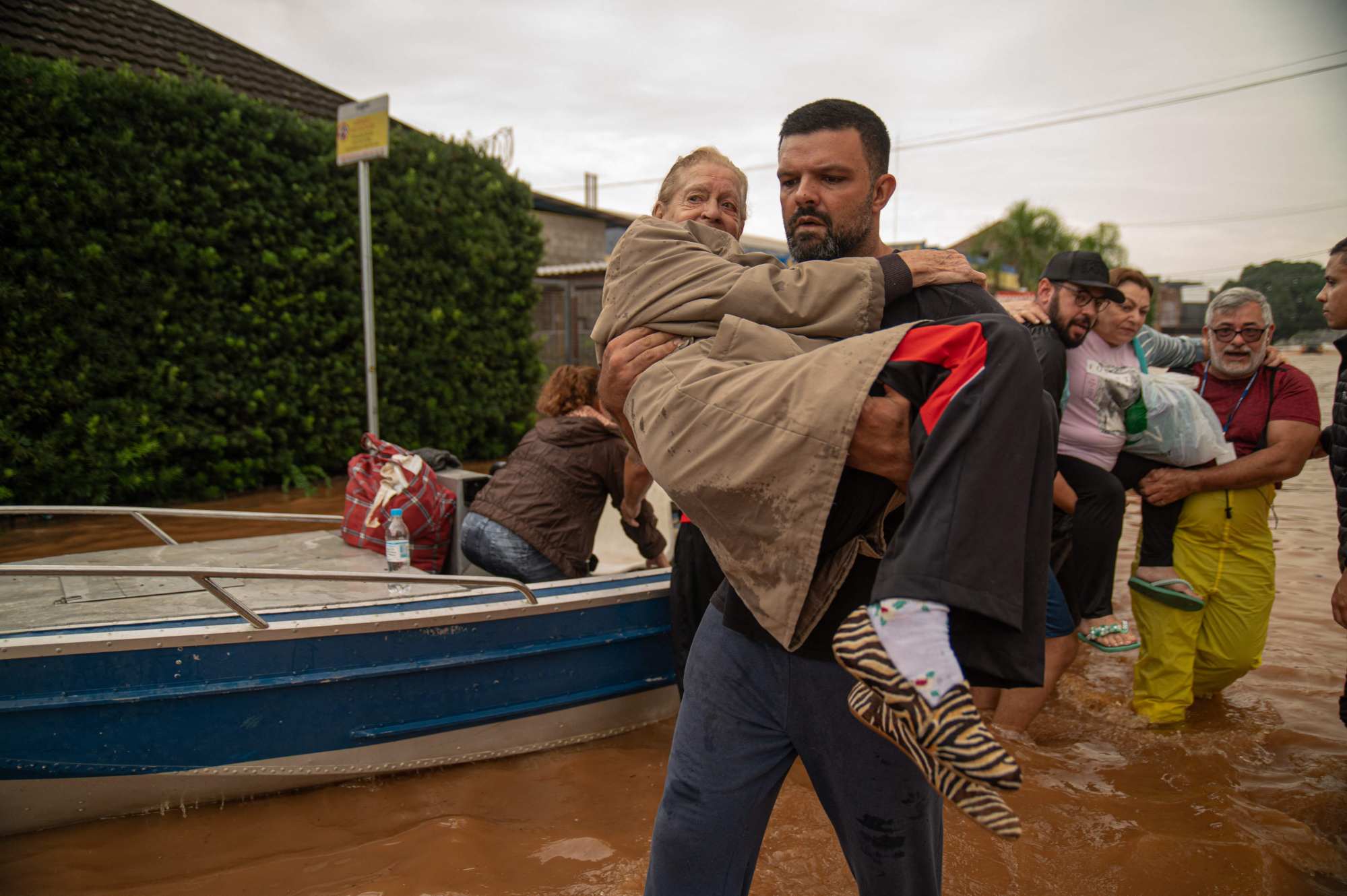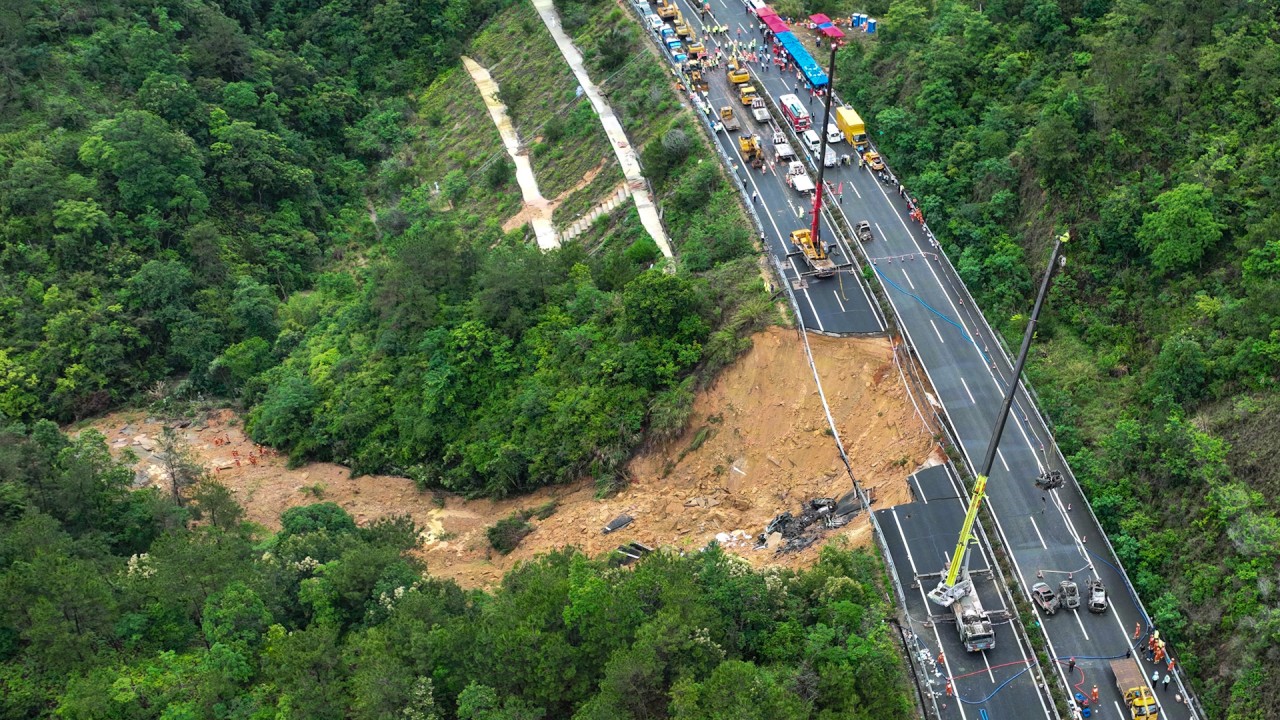
Death toll from southern Brazil floods rises to 78, 103 still missing
- Fast-rising water levels in Rio Grande do Sul were straining dams and threatening the economically important Porto Alegre, a city of 1.4 million
- President Luiz Inacio Lula da Silva arrived in Rio Grande do Sul on Sunday to discuss rescue and reconstruction works with local authorities
The death toll from heavy rains that have caused flooding in Brazil’s southern state of Rio Grande do Sul has risen to at least 78, local authorities said on Sunday, with tens of thousands of people displaced.
President Luiz Inacio Lula da Silva arrived in Rio Grande do Sul on Sunday, along with most members of his cabinet, to discuss rescue and reconstruction works with local authorities.
“Bureaucracy will not stand in our way, stopping us from recovering the state’s greatness,” Lula said at a press conference.
“It is a war scenario, and will need post-war measures,” state governor Eduardo Leite added.

Volunteers using boats, jet skis - and even swimming - have helped in rescue efforts. In the state capital Porto Alegre, Fabiano Saldanha said he and three friends have used jet skis to save about 50 people from flood waters since Friday in islands that are part of the city.
“The only thing we hear when we enter a street is ‘help,’ ‘help’,” Saldanha said.
The death toll could still substantially increase as 105 people were reported missing on Sunday, up from about 70 the day before, according to the state civil defence authority. It also said it was investigating whether another four deaths were related to the storms.

Floods have destroyed roads and bridges in several cities. The rains also have triggered landslides and the partial collapse of a dam at a small hydroelectric power plant.
In Porto Alegre, the Guaiba lake broke its banks by more than two metres (7ft), hitting the highest water level on records, according to the national geological service. Porto Alegre’s international airport has suspended all flights since Friday.
State Governor Eduardo Leite told reporters on Saturday evening that Rio Grande do Sul would need a “Marshall Plan” to recover from the storms and its consequences, referring to the US-led plan for Europe’s economic recovery after World War Two.
In the city of Canoas, near Porto Alegre, Julio Manichesque, 76, was rescued by volunteers after he had stayed since Friday on the roof of the house where he has lived for 52 years.
“I have never seen that much water,” Manichesque said.

In addition to the residents forced from their homes, the civil defence agency said more than a million people lacked access to potable water amid the flooding, describing damage as incalculable.
In many places, long queues formed as people tried to board buses, although bus services to and from the city centre were cancelled.

President Lula posted a video of a helicopter depositing a soldier on top of a house, where he used a brick to pound a hole in the roof and rescue a baby wrapped in a blanket.
Joao Guilherme, a 23-year-old salesman, found his way to safety in the state capital, but without his mobile phone. “I have no communication with anybody, I’m very shaken,” he said.
The speed of the rising waters unnerved Greta Bittencourt, 32, a professional poker player. “It’s terrifying because we saw the water rise in an absurd way, it rose at a very high speed,” Bittencourt said.
With waters starting to overtop a dyke along another local river, the Gravatai, Mayor Sebastiao Malo issued a stern warning on social media platform X, saying: “Communities must leave!”
He urged people to ration water, after four of the city’s six treatment plants had to be closed.
In a live transmission on Instagram, Governor Leite said the situation was “absolutely unprecedented”, the worst in the history of the state, home to agro-industrial production of soy, rice, wheat and corn.
Residential areas were under water as far as the eye could see, with roads destroyed and bridges swept away by powerful currents.
Rescuers faced a colossal task, with entire towns inaccessible.
At least 300 municipalities have suffered storm damage in Rio Grande do Sul since last Monday, according to local officials.
Roughly a third of the displaced have been brought to shelters set up in sports centres, schools and other facilities.
The rains also affected the southern state of Santa Catarina, where one man died on Friday when his car was swept away by raging floodwaters in the municipality of Ipira.
The president, who visited the region on Thursday, blamed the disaster on climate change.

The devastating storms were the result of a “disastrous cocktail” of global warming and the El Nino weather phenomenon, climatologist Francisco Eliseu Aquino told Agence France-Presse on Friday.
South America’s largest country has recently experienced a string of extreme weather events, including a cyclone in September that claimed at least 31 lives.
Aquino said the region’s geography meant it was often confronted by the effects of tropical and polar air masses colliding, but these events have “intensified due to climate change”.
Additional reporting by Agence France-Presse


